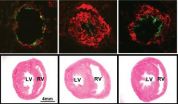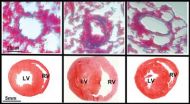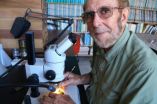Protein in 'good cholesterol' may be a key to treating pulmonary hypertension
2014-08-27
(Press-News.org) Oxidized lipids are known to play a key role in inflaming blood vessels and hardening arteries, which causes diseases like atherosclerosis. A new study at UCLA demonstrates that they may also contribute to pulmonary hypertension, a serious lung disease that narrows the small blood vessels in the lungs.
Using a rodent model, the researchers showed that a peptide mimicking part of the main protein in high-density lipoprotein (HDL), the so-called "good" cholesterol, may help reduce the production of oxidized lipids in pulmonary hypertension. They also found that reducing the amount of oxidized lipids improved the rodents' heart and lung function.
The study appears in the current online edition of the peer-reviewed journal Circulation.
A rare progressive condition, pulmonary hypertension can affect people of all ages. The disease makes it harder for the heart to pump blood through these vital organs, which can lead to heart failure.
"Our research helps unravel the mechanisms involved in the development of pulmonary hypertension," said Dr. Mansoureh Eghbali, the study's senior author and an associate professor of anesthesiology at the David Geffen School of Medicine at UCLA. "A key peptide related to HDL cholesterol that can help reduce these oxidized lipids may provide a new target for treatment development."
Lipids such as fatty acids become oxidized when they are exposed to free radicals — tiny particles that are produced when the body converts food into energy -- or when they are exposed to pollution, and in numerous other ways.
Although researchers have known that oxidized lipids played a role in the development of atherosclerosis and other vascular diseases, the UCLA team discovered higher-than-normal levels of oxidized proteins in rodents with pulmonary hypertension.
The UCLA researchers also knew that apoA-1, a protein that is a key component of HDL cholesterol, can reduce oxidized lipids, so they used a small peptide called 4F that mimics the action of apoA-1 and found that the 4F not only decreased the levels of oxidized lipids in the rodents, but also improved their heart and lung function. Specifically, the peptide restored the altered expression of a key molecule called micro ribonucleic acid (microRNA-193), which targets the action of essential enzymes involved in the production of oxidized lipids.
"The increased amounts of these oxidized lipids due to pulmonary hypertension keeps the expression of this molecule under check, which aggravates symptoms of the disease," said first author Dr. Salil Sharma, a UCLA postdoctoral researcher in anesthesiology.
By restoring the expression of microRNA-193 to its full potential, the researchers reduced the amount of oxidized lipids in the animals with pulmonary hypertension.
One of the hallmarks of pulmonary hypertension is a proliferation of smooth muscle cells in the lungs, which is harmful because it narrows the lungs' small blood vessels.
Additionally, Eghbali's team found reduced levels of microRNA-193 in the blood and lung tissue of human patients with the disease and discovered that they could slow the proliferation of the smooth muscle cells by increasing levels of microRNA-193 in the cells that had been isolated from these patients' lungs.
Further research will be required to test the potential of the HDL-related peptide and microRNA-193 in human disease, and to better understand how the levels of oxidized lipids in the blood may correlate to disease severity in people with pulmonary arterial hypertension.
INFORMATION:
The study was funded in part by the American Heart Association, the National Institute of Health, the UCLA Clinical and Translational Science Institute and the Iris Cantor–UCLA Women's Health Center executive advisory board.
The study's other authors were Dr. Soban Umar, Andrea Iorga, Gabriel Wong, Denise Mai and Dr. Kaveh Navab of the division of molecular medicine at UCLA's department of anesthesiology; David Meriwether, Dr. Mohamad Navab, Dr. Alan Fogelman and Dr. Srinivasa Reddy of the division of cardiology at UCLA's department of medicine; Dr. David Ross of the division of pulmonary critical care medicine at the David Geffen School of Medicine at UCLA's department of medicine; and Francois Potus, Sandra Breuils-Bonnet, Dr. Steve Provencher and Dr. Sébastien Bonnet of Laval University in Québec, Canada.
All of the intellectual property for the HDL-related peptide is owned by the University of California Regents and managed by the UCLA Office of Intellectual Property and Industry Sponsored Research. The technology is currently licensed exclusively to Bruin Pharma Inc. Fogelman, Navab and Reddy are principals in Bruin Pharma, and Fogelman is an officer in the company. Other disclosures are listed in the manuscript.
-UCLA-
ELSE PRESS RELEASES FROM THIS DATE:
Research geared to keep women from fleeing IT profession
2014-08-27
WACO, Texas (August 27, 2014) – For years, employers and experts have been trying to reverse the exodus of women from information technology positions.
They're failing.
Studies show that women are significantly underrepresented in the IT field, and the number of women who've graduated with degrees in computer and information science have plummeted from 37 percent in 1985 to 18 percent in 2011.
The failure to "stop the bleeding" stems, in part, from the industry's reliance on an oft-cited, outdated and under-studied research model, said Cindy Riemenschneider, Ph.D., ...
No cookie-cutter divorces, so what info should online co-parenting classes offer?
2014-08-27
URBANA, Ill. – Required online classes for divorcing couples who have children are good at teaching parents how to deal with children's needs and responses to their family's new situation. But co-parenting couples would benefit from content that helps adults cope with their own emotions and from unique tracks for families with special circumstances such as intimate partner violence or alcoholism, said a University of Illinois researcher in human and community development.
"There is no cookie-cutter divorcing couple, and with online programming, educators are able to supply ...
NASA telescopes uncover early construction of giant galaxy
2014-08-27
Astronomers have for the first time caught a glimpse of the earliest stages of massive galaxy construction. The building site, dubbed "Sparky," is a dense galactic core blazing with the light of millions of newborn stars that are forming at a ferocious rate.
The discovery was made possible through combined observations from NASA's Hubble and Spitzer space telescopes, the W.M. Keck Observatory in Mauna Kea, Hawaii, and the European Space Agency's Herschel space observatory, in which NASA plays an important role.
A fully developed elliptical galaxy is a gas-deficient ...
The high cost of hot flashes: Millions in lost wages preventable
2014-08-27
The steep decline in the use of hormone therapy has spawned a prevalent but preventable side effect: millions of women suffering in silence with hot flashes, according to a study by a Yale School of Medicine researcher and colleagues.
In the study published in the Aug. 27 online issue of the journal Menopause, the team found that moderate to severe hot flashes — also called vasomotor symptoms (VMS) — are not treated in most women. Women with VMS experience more than feeling hot; other frequently occurring symptoms include fatigue, sleep disturbance, depression, anxiety, ...
NASA begins hurricane mission with Global Hawk flight to Cristobal
2014-08-27
The first of two unmanned Global Hawk aircraft landed at NASA's Wallops Flight Facility in Wallops Island, Virginia, on Aug. 27 after surveying Hurricane Cristobal for the first science flight of NASA's latest hurricane airborne mission.
NASA's airborne Hurricane and Severe Storm Sentinel, or HS3, mission returns to NASA Wallops for the third year to investigate the processes that underlie hurricane formation and intensity change in the Atlantic Ocean basin. HS3 is a collaborative effort that brings together several NASA centers with federal and university partners.
The ...
Junk food makes rats lose appetite for balanced diet
2014-08-27
A diet of junk food not only makes rats fat, but also reduces their appetite for novel foods, a preference that normally drives them to seek a balanced diet, reports a study published in the open-access journal Frontiers in Psychology.
The study helps to explain how excessive consumption of junk food can change behavior, weaken self-control and lead to overeating and obesity.
The team of researchers, led by Professor Margaret Morris, Head of Pharmacology from the School of Medical Sciences, UNSW Australia, taught young male rats to associate each of two different sound ...
Nanodiamonds are forever
2014-08-27
Most of North America's megafauna — mastodons, short-faced bears, giant ground sloths, saber-toothed cats and American camels and horses — disappeared close to 13,000 years ago at the end of the Pleistocene period. The cause of this massive extinction has long been debated by scientists who, until recently, could only speculate as to why.
A group of scientists, including UC Santa Barbara's James Kennett, professor emeritus in the Department of Earth Science, posited that a comet collision with Earth played a major role in the extinction. Their hypothesis suggests that ...
IU study: Social class makes a difference in how children tackle classroom problems
2014-08-27
BLOOMINGTON, Ind. -- An Indiana University study has found that social class can account for differences in how parents coach their children to manage classroom challenges. Such differences can affect a child's education by reproducing inequalities in the classroom.
"Parents have different beliefs on how to deal with challenges in the classroom," said Jessica McCrory Calarco, assistant professor in IU Bloomington's Department of Sociology in the College of Arts and Sciences. "Middle-class parents tell their children to reach out to the teacher and ask questions. Working-class ...
Wolves susceptible to yawn contagion
2014-08-27
Wolves may be susceptible to yawn contagion, according to a study published August 27, 2014 in the open-access journal PLOS ONE by Teresa Romero from The University of Tokyo, Japan, and colleagues.
Researchers suggest that contagious yawning may be linked to human capacity for empathy, but little evidence apart from studies on primates, exists that links contagious yawning to empathy in other animals. Recently, researchers have documented domestic dogs demonstrating contagious yawning when exposed to human yawns in a scientific setting, but it is unclear whether this ...
Stone-tipped spears more damaging than sharpened wooden spears
2014-08-27
Experimental comparison may show that stone-tipped spears do not penetrate as deep, but may still cause more damage, than sharpened wooden spears, according to a study published August 27, 2014 in the open-access journal PLOS ONE by Jayne Wilkins from Arizona State University and colleagues.
The creation of stone-tipped weapons (wooden shaft + binding materials + stone point) by our ancestors ~500,000 years ago points to the development of new cognitive and social learning at the time. The development may have provided an advantage over simpler hunting methods, such as ...









